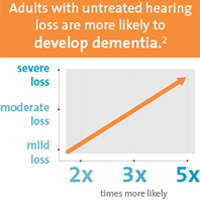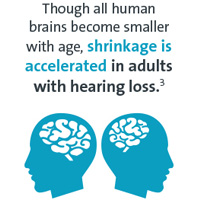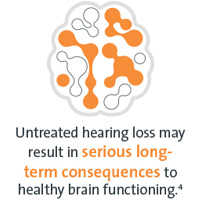
Call to schedule an appointment today!
Falmouth, ME: (207) 541-9295
Medical Hearing Conditions

Dementia & Hearing Loss
Better Hearing May Help Reduce the Likelihood of Dementia & Alzheimer's

“Hearing aids could delay or prevent dementia by improving patients’ hearing”
– Johns Hopkins and National Institute on Aging
A recent study by Johns Hopkins Medicine and the National Institute of Aging report a correlation between untreated hearing loss and the development of dementia and Alzheimer’s.Hearing loss and dementia The main cause for concern relates to a term called ‘auditory deprivation’ which means that instead of the brain actively processing sounds throughout the day, the decrease in sounds, due to hearing loss, reduces this stimulation of the brain. The reduction of brain activity from processing sounds and comprehending speech may play a big factor in the development of dementia in many cases.
“Seniors with hearing loss are significantly more likely to develop dementia over time than those who retain their hearing”
Untreated hearing loss can have an impact on more than just communication abilities and relationships, it now is also is being reported that it is linked to the increased development of dementia. Treating hearing loss with the use of hearing aids can be a very important step towards delaying or preventing dementia. We recommend that anyone experiencing hearing loss, or for a loved one, to take the important first step in addressing the issue by scheduling an appointment for a complimentary hearing consultation.
Simply contact our office by phone or submit your information in the form on the left side of this page. We’ll be glad to help determine what treatment may be beneficial for any hearing loss that may exist to ensure the impact is minimal over time.
Untreated Hearing Loss
Treat hearing loss before it’s too late.



Treating hearing loss can help.
If you let mild, moderate or severe hearing loss go untreated, research shows you’re more likely to develop dementia. But treating hearing loss with hearing aids has been shown to help. Call us, or fill out the contact us form to schedule an appointment today!
Tinnitus - What you should know
What is Tinnitus
Tinnitus is the medical term for the sensation of hearing sound in your ears when no external sound is present. It affects 50 million (nearly one in six) Americans. Most describe the sound as ringing, though others describe it as hissing, buzzing, whistling, roaring or chirping.
For some, tinnitus is mild or intermittent. For others, it’s severe and can have a profound impact on their quality of life. For everyone, finding tinnitus relief is important.
Did you know?
- Up to 90% of people with tinnitus have some level of noise-induced hearing loss.1
- 1 in 10 American adults have experienced tinnitus lasting at least five minutes in the past year.2
- Tinnitus is the leading service-related disability among U.S. veterans.3
What causes tinnitus?
The exact physical cause of tinnitus is not known, but several sources can trigger it or make it worse, including:
- Loud noises and hearing loss – Exposure to loud noises can destroy the non-regenerative cilia (tiny hairs) in the cochlea, causing permanent tinnitus and/or hearing loss.
- Aging – As you age, those same cilia gradually deteriorate, which can lead to tinnitus and/or hearing loss.
- Ototoxic medications – Some prescription medications such as antibiotics, anti-inflammatories and antidepressants are harmful to the inner ear as well as the nerve fibers connecting the cochlea to the brain.
- Hearing conditions – Disorders like otosclerosis and Ménière’s disease are known to cause tinnitus.
- Health conditions – Tinnitus can also be a symptom of health conditions like cardiovascular disease, hypertension, stress and head injuries.
Is there a cure?
Currently, there is no known tinnitus cure. But according to the American Tinnitus Association, there are recommended ways to get relief, including counseling and sound therapy.
Proven tinnitus relief products are an effective part of any sound therapy. They utilize a customizable and comforting sound stimulus to soothe the annoying noises associated with tinnitus.
What should you do if you think you have tinnitus?
The first step is to visit a hearing healthcare professional for a clinical evaluation. Specialized tests are performed to diagnose tinnitus and different options can be discussed to find what is right for you.
1 Source: WebMD
2 Source: National Institute on Deafness
3 Source: American Tinnitus Association
Falmouth Hearing Aids
Helping Maine Hear Better
Suite 100
Falmouth, ME 04105
Phone: (207) 541-9295
Fax: (207) 541-9296
Office Hours
Tuesday – Friday: 9:30-4:30
Early and late hours available by appointment.
House visits also available.